
Marion Post Wolcott “Center of town. Woodstock, Vermont. Snowy night” 1940

Long analysis by Hudson. Trump as Obama’s legacy. And ousting Bernie has left America without a Democratic party, like some self-fulfilling prophecy. (Graph is from another source, but a very good fit)
• Will Trump’s Victory Break Up the Democratic Party? (Michael Hudson)
Trump is sufficiently intuitive to proclaim the euro a disaster, and he recommends that Greece leave it. He supports the rising nationalist parties in Britain, France, Italy, Greece and the Netherlands, all of which urge withdrawal from the eurozone – and reconciliation with Russia instead of sanctions. In place of the ill-fated TPP and TTIP, Trump advocates country-by-country trade deals favoring the United States. Toward this end, his designated ambassador to the European Union, Ted Malloch, urges the EU’s breakup. The EU is refusing to accept him as ambassador. At the time this volume is going to press, there is no way of knowing how successful these international reversals will be. What is more clear is what Trump’s political impact will have at home. His victory – or more accurately, Hillary’s resounding loss and the way she lost – has encouraged enormous pressure for a realignment of both parties.
Regardless of what President Trump may achieve vis-à-vis Europe, his actions as celebrity chaos agent may break up U.S. politics across the political spectrum. The Democratic Party has lost its ability to pose as the party of labor and the middle class. Firmly controlled by Wall Street and California billionaires, the Democratic National Committee (DNC) strategy of identity politics encourages any identity except that of wage earners. The candidates backed by the Donor Class have been Blue Dogs pledged to promote Wall Street and neocons urging a New Cold War with Russia. They preferred to lose with Hillary than to win behind Bernie Sanders. So Trump’s electoral victory is their legacy as well as Obama’s. Instead of Trump’s victory dispelling that strategy, the Democrats are doubling down. It is as if identity politics is all they have.
Trying to ride on Barack Obama’s coattails didn’t work. Promising “hope and change,” he won by posing as a transformational president, leading the Democrats to control of the White House, Senate and Congress in 2008. Swept into office by a national reaction against the George Bush’s Oil War in Iraq and the junk-mortgage crisis that left the economy debt-ridden, they had free rein to pass whatever new laws they chose – even a Public Option in health care if they had wanted, or make Wall Street banks absorb the losses from their bad and often fraudulent loans. But it turned out that Obama’s role was to prevent the changes that voters hoped to see, and indeed that the economy needed to recover: financial reform, debt writedowns to bring junk mortgages in line with fair market prices, and throwing crooked bankers in jail.
Obama rescued the banks, not the economy, and turned over the Justice Department and regulatory agencies to his Wall Street campaign contributors. He did not even pull back from war in the Near East, but extended it to Libya and Syria, blundering into the Ukrainian coup as well. Having dashed the hopes of his followers, Obama then praised his chosen successor Hillary Clinton as his “Third Term.” Enjoying this kiss of death, Hillary promised to keep up Obama’s policies. The straw that pushed voters over the edge was when she asked voters, “Aren’t you better off today than you were eight years ago?” Who were they going to believe: their eyes, or Hillary? National income statistics showed that only the top 5% of the population were better off. All the growth in GDP during Obama’s tenure went to them – the Donor Class that had gained control of the Democratic Party leadership. Real incomes have fallen for the remaining 95%.
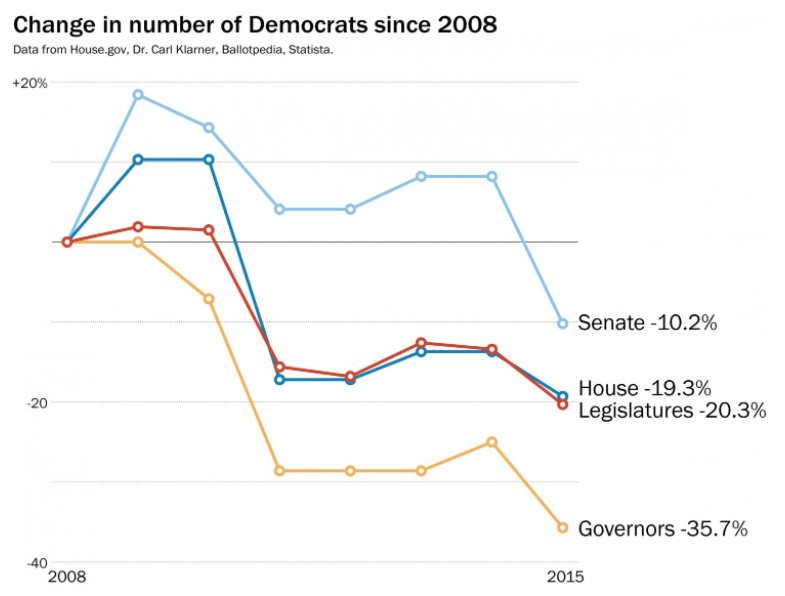

Rates still no low enough?
• Condo Flippers in Miami-Dade Face The End Of A Bubble (WS)
Miami-Dade’s spectacular condo flipping mania is in turmoil, with sales plunging, inventory-for-sale soaring, and new supply flooding the market. It’s not like Miami hasn’t been through this before. In February, existing home sales of all types fell 10% year-over-year, to 1,835 homes. These sales “do not include Miami’s multi-billion dollar new construction condo market,” the Miami Association of Realtors clarified in its report on March 23. And this new construction market that is not included has become distressed. Sales of single-family homes fell 10% in February, to 881 houses. The report blamed the shortage of properties “in popular price points.” Prices have been rising sharply, and at the price points where people could actually buy a house – below $250,000 – few sellers were playing ball.
Hence a stalling market. Sales of high-priced units rose, but they weren’t enough to pull out the totals. Condo sales fell 10% as well, to 954 units. This time, the report didn’t blame the lack of supply. Instead: “Existing condo sales are competing with a robust new construction market.” At the same time, inventory of existing condos for sale, not including new units, rose 10% to 15,289. At the current sales rate, supply soared 29% to 14 months. This chart by StatFunding shows the plunge in sales and the surge in condos listed for sale. I circled the last five Februaries on the sales line (red). From February 2014 to February 2017, condo sales have plunged 25%. Andrew Stearns, StatFunding’s founder and CEO, calls the resale inventory – the dark green line that has soared 90% since early 2013 – “scary”:
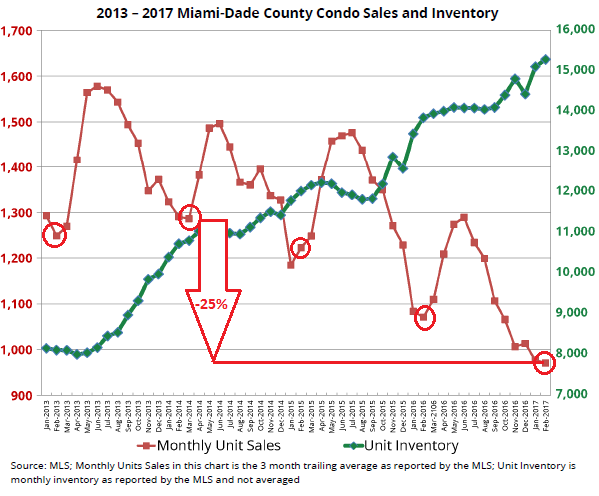

When ‘normalization’ becomes the scariest idea around.
• What Global Central Bank Normalization Would Look Like (ZH)
As a result of countless failures by central banks to normalize monetary policy over the past 7 years, the market – especially bonds and rates – has become openly cynical and outright skeptical regarding the possibility of a successful renormalization of policy by global central banks. After all, Japan has been trying to do that for over 30 years and has yet to succeed; the ECB hiked in 2011 resulting in near collapse of the Eurozone. Ironically, the recent Trumpflation trade – which few expected as a result of the “shocking” Trump election victory – has emerged as the most credible catalyst to prompt inflation not only in the US but around the globe, resulting in two Fed rate hikes in rapid succession.
Still, now that Obamacare repeal has failed, and questions are rising whether Trump will be able to implement his proposed Tax reform, the market has aggressively faded not only the broader Trumpflation trade, but also all of the recent dollar strength since the US election: in short, bets on a “bening” global reflation are rapidly fading, suggesting that the latest push to normalize monetary policy will once again result in failure. And yet, “what if it goes according to plan” this time? That’s the question posed by Barclays’ Christian Keller who notes that, at least for the time being, “The synchronized upswing in the global economy continues, supporting sentiment, which thus far has ignored elevated policy uncertainties. Headline inflation is increasing due to stable oil prices, while core inflation rates are mixed.”
And, assuming nothing changes, this sets the backdrop for monetary policy normalization, albeit at different speeds and modes. Taking this thought experiment one step further, what would happen if indeed this time central banks are successful to renormalize monetary policy without leading to a market crash. In that case, Barclays expects three Fed hikes in 2017 and 2018, respectively. The ECB is likely to taper further in 2018 and to start increasing depo rates in parallel (in 2018). Conveniently, Barclays has created the following chart which lays out what “coordinated global renormalization” would look like. It can serve as a benchmark to those keeping tabs on where various central banks are in the current attempt to restore monetary normalcy.
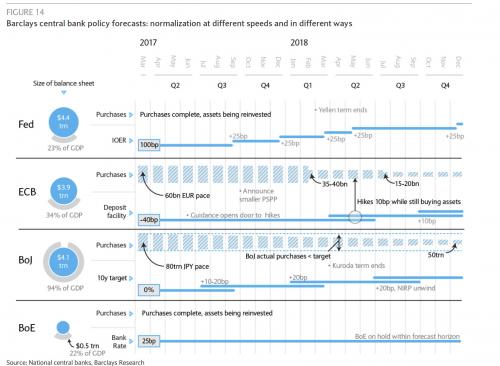

Franklin D. Roosevelt, populist.
• Populism: The Phenomenon (Dalio et al)
Populism is a political and social phenomenon that arises from the common man, typically not well- educated, being fed up with 1) wealth and opportunity gaps, 2) perceived cultural threats from those with different values in the country and from outsiders, 3) the “establishment elites” in positions of power, and 4) government not working effectively for them. These sentiments lead that constituency to put strong leaders in power. Populist leaders are typically confrontational rather than collaborative and exclusive rather than inclusive. As a result, conflicts typically occur between opposing factions (usually the economic and socially left versus the right), both within the country and between countries. These conflicts typically become progressively more forceful in self- reinforcing ways.
Within countries, conflicts often lead to disorder (e.g., strikes and protests) that prompt stronger reactions and the growing pressure to more forcefully regain order by suppressing the other side. Influencing and, in some cases, controlling the media typically becomes an important aspect of engaging in the conflicts. In some cases, these conflicts have led to civil wars. Such conflicts have led a number of democracies to become dictatorships to bring order to the disorder that results from these conflicts. Between countries, conflicts typically occur because populist leaders’ natures are more confrontational than cooperative and because conflicts with other countries help to unify support for the leadership within their countries.
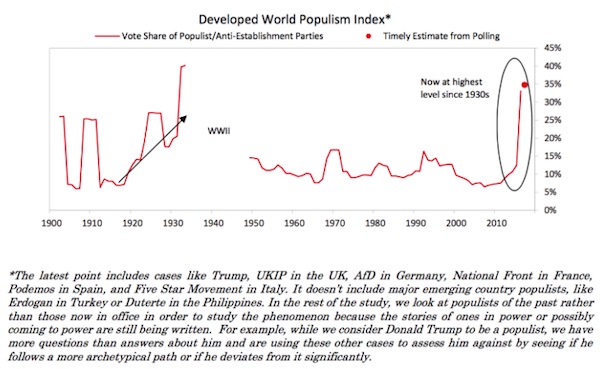
In other words, populism is a rebellion of the common man against the elites and, to some extent, against the system. The rebellion and the conflict that comes with it occur in varying degrees. Sometimes the system bends with it and sometimes the system breaks. Whether it bends or breaks in response to this rebellion and conflict depends on how flexible and well established the system is. It also seems to depend on how reasonable and respectful of the system the populists who gain power are.
[..] In the period between the two great wars (i.e., the 1920s-30s), most major countries were swept away by populism, and it drove world history more than any other force. The previously mentioned sentiments by the common man put into power populist leaders in all major countries except the United States and the UK (though we’d consider Franklin D. Roosevelt to be a quasi-populist, for reasons described below). Disorder and conflict between the left and the right (e.g., strikes that shut down operations, policies meant to undermine the opposition and the press, etc.) prompted democracies in Italy, Germany, Spain, and Japan to choose dictatorships because collective/inclusive decision making was perceived as tolerance for behaviors that undermined order, so autocratic leaders were given dictatorial powers to gain control.
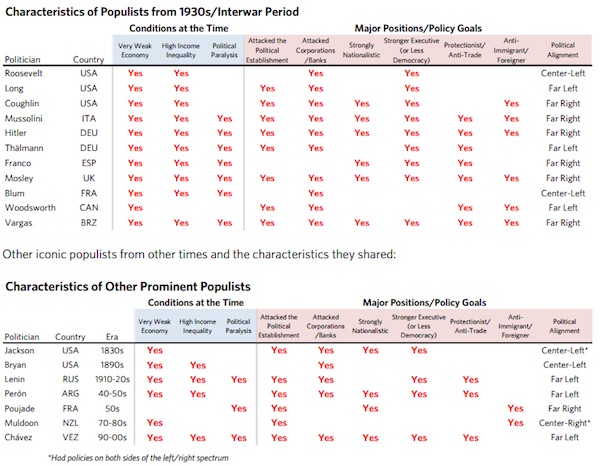

The differences are huge. In lots of countries going cashless is not going to fly.
• The Peak Of – Dirty – Cash? (ZH)
In several major economies it’s crunch time for the future of cash. Goldman Sachs notes that this is largely policy-driven: tangible steps are being taken to wean economies off cash (e.g. India, Europe); but adds that, at the same time consumer expectations around convenience are rising and enabling technologies have proliferated in the shape of contactless cards, mobile wallets, cryptocurrencies and more. So, they ask, does the decline in cash payments imply the demise of cash? Not necessarily. Technology has been an important catalyst for shrinking cash usage, but it is by no means a new phenomenon. As we wrote in 2012, the first technological step-change in the payments arena was the shift from cash to plastic money, i.e. credit and debit cards, which happened in the 1960s.
There are many parallels to be drawn between that period and the ongoing shift to digital money: an initial period of an increasing number of providers was followed by a consolidation stage that established a few players (Visa and MasterCard primarily) as the industry standards, eventually accelerating the adoption of plastic money. However, the availability of technology alone has not ensured the demise of cash. As the following chart shows, there are several advanced economies in which it is still the dominant mode of payment in volume terms (surprisingly quite a few European countries are in the bottom left quadrant).
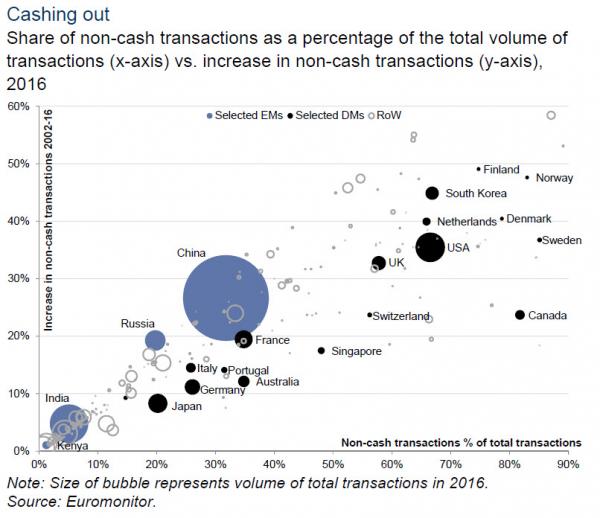
Japan is a striking example of this; lots of tech and lots of cash. The US also stands out, and this could at least partly be attributed to the fact that regulators in the US have explicitly stated that the market should manage the shift to digital payments by itself. On the other hand, Scandinavian countries are on the cusp of becoming some of the first cashless societies, as a result of industry-co-ordinated steps and government initiatives. Swish, a payment app developed jointly by the major Swedish banks, has been adopted by nearly half the Swedish population, and is now used to make over nine million payments a month. About 900 of Sweden’s 1,600 bank branches no longer keep cash on hand or take cash deposits and many, especially in rural areas, no longer have ATMs.
In conjunction with that, cash transactions were just c.2% of the value and 20% of the volume of all payments made last year (down from 40% five years ago). Denmark’s move to a cashless society is a deliberate result of policy, with the government removing the obligation for some retailers to accept payment in cash. Without this legislative push, we believe cash is very difficult to disrupt and substitute. After all, it is a free and convenient mode of transacting. So far, the selling point of the most broadly used alternatives to cash (cheques and cards) is greater convenience. But that hasn’t been sufficient to meaningfully reduce the market share of cash in countries outside Scandinavia and Canada.
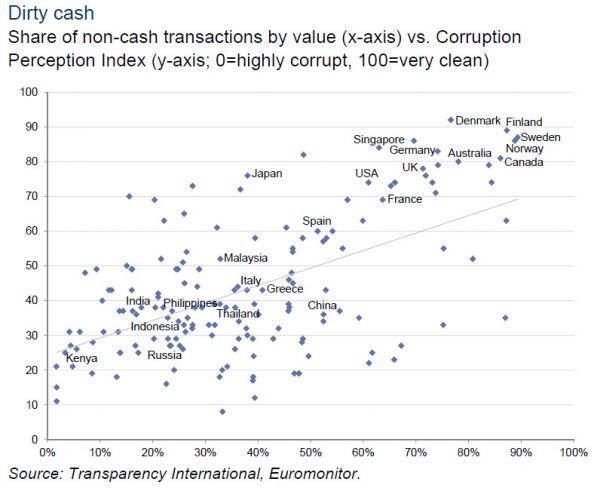

Plenty of theories.
• Explaining Why White Middle Aged America Is Killing Itself (Worstall)
Back 18 months the team of Anne Case and Angus Deaton (who has since gained the economics Nobel) released a famous paper pointing out that white rural Americans were killing themselves. So much so that expected lifespans were in fact falling such was the rise in middle aged morbidity. That original paper found that the effect was geographically concentrated. And as I remarked at the time that’s a bit of a problem for the causality of that rise in morbidity. For we’ve got rather a lot of migration out of those rural areas. And it’s the better educated doing the leaving. Thus it is possible (no, no one has studied this in enough detail as yet for anyone to know) that the effect found is entirely down to those migration effects.
We know very well that poorer and less educated people are more likely to die in middle age than richer and better educated. So, if all the better educated and thus, in our current society, higher income people move away we will observe a rise in the death rate among the remnant population. Case and Deaton have returned to this subject with a new paper. And they agree that there is some of this compositional effect in their earlier findings: “It is important not to focus on those with less than a high school degree, a group that has grown markedly smaller over time, and is likely to be increasingly negatively selected on health.” And: “.. we note that for age-groups younger than 45, there has been a decline in the fraction of WNHs with only a high school degree, so that selection may be playing some role for the younger groups.”
Excellent, so that intuition of mine about those compositional effects was indeed correct at least in part. However, this new paper then drives a steamroller through my explanation by showing that this rise in morbidity is country-wide among that class and age group, middle aged and less educated whites. Except, well, I’m not quite sure it does. Fortunately, as I said last time, this is such an important result coming from such a well known name that it will be fully investigated. It’s not just going to be either ignored nor accepted at face value either. People will keep picking away at this until the definitive answer is understood.

Yeah, the idea behind the EU was good. The execution has been terrible though. Celebrate while holding your breath.
• Brexit Vote Is ‘Closed Nationalism’ That Belongs In Past, Says Italian PM (G.)
Britain’s decision to leave the EU has been described by the Italian prime minister as “closed nationalism” that belongs in the past during a summit in Rome to celebrate the bloc’s 60th anniversary. In an address at the Orazi and Curiazi Hall of the Capitol in the Piazza del Campidoglio, where the EU was founded six decades ago, Paolo Gentiloni expressed his discomfort with the motives behind the referendum result. He blamed the EU for not responding adequately to the economic crisis of 2008, but said: “That triggered in part of public opinion, unfortunately the majority of public opinion in the United Kingdom, it triggered a crisis of rejection. It brought forward the closed nationalism that we thought has been closed down in the archives.”
The leaders of the 27 member states that will make up the EU after the UK’s departure assembled on Saturday to mark the day on which six nations signed what was to become the Treaty of Rome. They signed a Rome declaration, which offered ringing phrases about peace and unity, and the importance of maintaining the union. “We, the leaders of 27 member states and of EU institutions, take pride in the achievements of the European Union: the construction of European unity is a bold, far-sighted endeavour,” it says. “Sixty years ago, recovering from the tragedy of two world wars, we decided to bond together and rebuild our continent from its ashes.
“We have built a unique union with common institutions and strong values, a community of peace, freedom, democracy, human rights and the rule of law, a major economic power with unparalleled levels of social protection and welfare. “European unity started as the dream of a few, it became the hope of the many. Then Europe became one again. Today, we are united and stronger: hundreds of millions of people across Europe benefit from living in an enlarged union that has overcome the old divides.” The document stipulates that the EU will make progress on a social dimension, building on its citizens’ rights, and that some member states will enhance their cooperation, particularly in the field of defence. The text concludes: “We have united for the better. Europe is our common future.”

Grains vs grapes. Why Southern Europeans are not big drinkers.
• Drink and Women – It’s A Culture Thang (DA)
When it comes to consumables, though, blowing it on drink is not such a southern European thing. On old professor of mine, an expert in the history of booze (among other substances) often observed that Europe is divided into north and south by distinct cultures of intoxication rooted in our prehistory – the grape in the south, the grain in the north, originally the function of geography and climate which in turn determined access to different sources of plant sugar.
It is the grain-fermenting northerners who have traditionally drunk themselves to oblivion, and it is them that felt the teetotal backlash of the protestant reformation, whereas the Mediterranean world used their fermented grape juice more sparingly and even made it “taboo” by ghoulishly turning it into blood in the Christian sacrament. It is said that you can still observe this divide by walking down the main street of any Mediterranean town hosting a Club 18-30 resort in high tourist season. Some might say, therefore, that Jeroen is merely projecting his own cultural inclinations. They don’t call it Dutch courage for nothing.
No, when it comes to consumables, another famous one-line aetiology of the Greek crisis comes to mind: “We ate it together” (”Mazí ta fágame”), is what PASOK grandee Theodoros Pangalos poffered in 2010 in response to the question “where did the money go?”. A succinct description of the workings of clientelism, delivered by a true master of the art. The saying survives and thrives, in large part because it had a grotesque, evocative appeal in light of the speaker’s own well-fed physique, an apparent embodiment of gluttony openly admitting to the sin and beckoning us to join him at the trough. In the popular imagination it conjured up images of the Greek political class, bloated with greed both physical and metaphorical, sharing a well-furnished table with their clients, the ordinary voters.
And although we, too, like to accuse our elites of eating Marie Antoinette’s cake and caviar (or perhaps the Greek pre-crisis equivalent, lobster spaghetti), the most appropriate fare loading down the table would be a cholesterol feast, most likely at Baïraktaris, the legendary Athens kebab house and political hangout. Not the starched white tablecloths of Washington’s Palm Grill, London’s private clubs, or the Michelin-starred chateaux of Gallic political intrigue, but oilcloth and stacks of paper napkins, the great equaliser, where we do indeed tuck in together in large, boisterous groups. You may recall Baïraktaris as the scene of another famous apophthegm, by another regular, former Prime Minister Costas Karamanlis, to the effect that “five pimps run this country”. And that is as far as I will go with the “women” element.

Bartender, stop serving this man.
• Portugal’s Cabral Says Dijsselbloem Resignation Is Best for EU (BBG)
Portugal’s Economy Minister Manuel Caldeira Cabral said Jeroen Dijsselbloem, whose Dutch party lost elections this month, should quit as chairman of the European finance ministers’ group after his comments about the duties of nations getting aid were deemed offensive. “It would be the best thing for Europe and the best thing he could do,” Cabral said in a Bloomberg Television interview from the Boao Forum for Asia, an annual conference on the southern Chinese island of Hainan. “He just lost an election and I think he should not be trying to blame others for his own failures.” Dijsselbloem is under pressure to resign as leader of the euro area’s finance ministers after a German newspaper cited him saying, “I can’t spend all my money on women and drink and then at the end ask for your help.”
That remark inflamed tensions between stronger economies in the north and weaker nations including Greece, Ireland and Portugal. The Eurogroup chief has said he regrets causing offense, but doesn’t intend to resign. “I don’t think we can let the Eurogroup be divided in that way, and for that reason that person should be out,” Cabral said. “One of the worst things that some European responsibles have done in the past is not being leaders and trying to surpass their own difficulties at home by accusing other countries. This is a way of destroying Europe.”
On the U.K.’s withdrawal from the European Union, Cabral said the bloc must focus on getting good results from negotiations in the next two to five years and then moving on to other issues. He said broader trade pacts should be the goal rather than making Brexit the only thing on the agenda for Europe and the U.K. The EU should focus on trade talks that give serious results and make a priority “of opening to the world, of negotiating with Asia, of being part of this intuitive of One Belt-One Road with China and establishing links with Asia,” he said in the interview.

Large military parade yesterday in Athens. Fighter jets flying so low car alarms were going off all the time.
• Trump Marks Greek Independence Day With Ominous Message (AP)
President Donald Trump has marked Greek Independence Day with a rather ominous message. At a White House reception, Trump said that in the years to come “we don’t know what will be required to defend our freedom.” But he said it will take “great courage, and we will show it.” Greek Independence Day commemorates the start of the 1821 war that led to Greece’s independence after nearly 400 years as part of the Ottoman Empire. It’s celebrated annually on March 25. Trump told the crowd, “I love the Greeks.” He also introduced Greek-American members of the White House staff, including chief of staff Reince Priebus. Trump said Priebus is “really terrific and hard-working,” along with being “one of the top Greeks in the country.”

“..they were often too scared to pick up their allowance for fear of being detained.”
• Syrian Asylum Seekers In UK Forced Into Poverty, Fear Deportation (G.)
Hundreds of Syrian asylum seekers are struggling to survive in the UK, with some facing destitution and others forced into exploitative work because they are afraid of being detained and deported. The Observer has found Syrian asylum seekers working in warehouses, construction sites and garages for as little as £10 a day. Many had stopped signing in with the Home Office after being held in detention centres for months. Hundreds more are living in destitution, reliant on charities for food parcels and clothes. Mike Adamson, chief executive of the British Red Cross, said: “A two-tier system, where Syrian nationals who arrive in the UK as asylum seekers are left vulnerable to exploitation, seems completely at odds with the spirit behind the government’s commitment to offer a safe home to 20,000 Syrian refugees under its resettlement programme.
The Observer interviewed 10 Syrians, all living in limbo because of the Dublin regulation, which means asylum seekers can be sent back to the first EU country they reach. The men were fighting removal to countries including Bulgaria, where Human Rights Watch found asylum seekers being shot at, beaten with weapons by uniformed officials and sent back to Turkey. Several of the men we spoke to were being threatened with removal to Hungary, despite the fact that the Home Office told the Observer that it is not currently returning asylum seekers there. At least 50 Syrians have been removed under the regulation since the start of 2015, prompting some to drop off the radar. Eight of the men interviewed said that they had stopped signing in with immigration authorities because they were afraid of detention and removal. Most had family in the UK and were supporting themselves by working illegally.
[..] The Red Cross said it had seen 1,341 destitute Syrian asylum seekers in Britain last year, up from 1,159 the year before. In South Yorkshire, a quarter of all destitute asylum seekers seen, of all nationalities, said they experienced hunger every day. In nearly half of all the cases seen by the Red Cross, asylum seekers were facing destitution, despite receiving the full £36 a week afforded to them under government rules. The Syrians the Observer interviewed said they were often too scared to pick up their allowance for fear of being detained.

Return to the desert. It’ll take centuries to refill the aquifer.
• Ogallala: What Happens to the US Midwest When the Water’s Gone? (NatGeo)
For the past 60 years, the Ogallala has been pumped out faster than raindrops and snowmelt can seep back into the ground to replenish it, thanks largely to irrigation machinery like the one sleeping nearby. As a result, in parts of western Kansas, the aquifer has declined by more than 60% during that period. In some parts, it is already exhausted. The decline is steady now, dry years or wet. In 2015 rain was exceptionally heavy—50 to 100% above normal. Even so, water levels in the wells dropped again. Wilson’s field report will put the best face on it, noting it was the slowest decline in five years.
Tagging along with Wilson, I am nearing the end of a 5,000-mile journey along the back roads of Ogallala territory, from South Dakota to Texas. My drive has taken me through some of the most productive farmland anywhere, home to at least a $20-billion-a-year industry that grows nearly one-fifth of the United States’ wheat, corn, and beef cattle. It’s also a place facing hard choices: Farmers can reduce consumption of water to further extend the life of the aquifer. Or they can continue on their path toward an end that is already in sight. Some don’t like to frame the dilemma quite so starkly. But if they don’t reduce pumping and the aquifer is drained, food markets will be profoundly affected around the world. In the coming decades this slow-speed crisis will unfold just as the world needs to increase food production by 60%, according to the United Nations, to feed more than nine billion people by mid-century.
The draining of North America’s largest aquifer is playing out in similar ways across the world, as large groundwater basins in Asia, Africa, and the Middle East decline rapidly. Many of these aquifers, including the southern Ogallala, have little ability to recharge. Once their water is gone, they could take thousands of years to refill. “The consequences will be huge,” says Jay Famiglietti, senior water scientist at NASA Jet Propulsion Laboratory and lead researcher on a study using satellites to record changes in the world’s 37 largest aquifers. “We need to sustain groundwater to sustain food production, and we’re not doing it. Is draining the Ogallala the smartest thing for food production in the U.S. and globally? This is the question we need to answer.”








